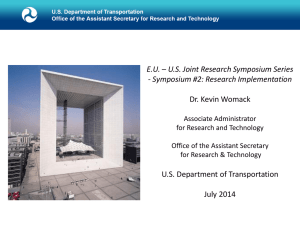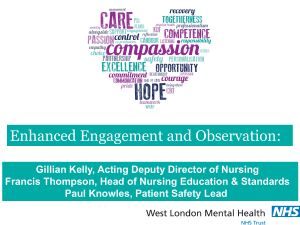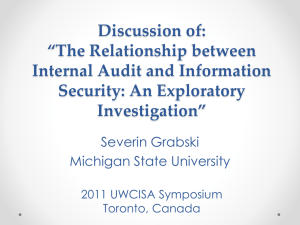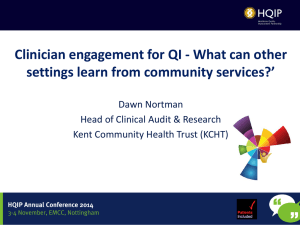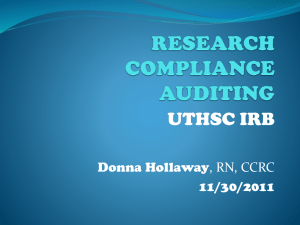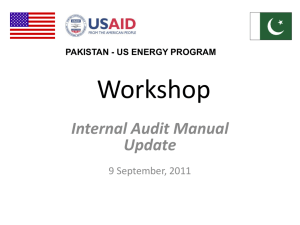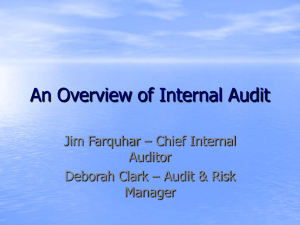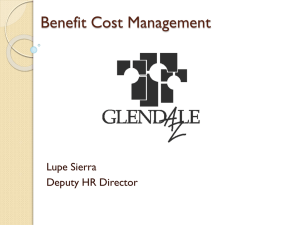Social Media Challenge - UCSB Policies and Procedures
advertisement
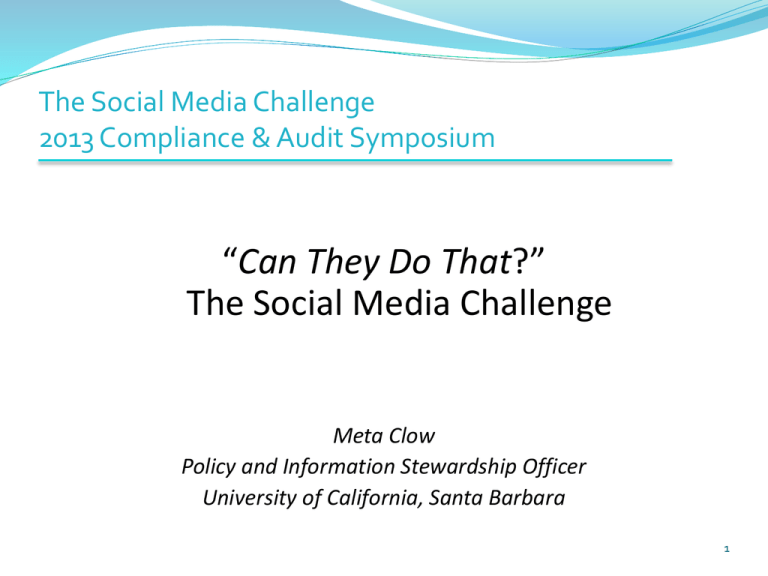
The Social Media Challenge 2013 Compliance & Audit Symposium “Can They Do That?” The Social Media Challenge Meta Clow Policy and Information Stewardship Officer University of California, Santa Barbara 1 The Social Media Challenge 2013 Compliance & Audit Symposium Scenario 1: Recruiting for Excellence 2 The Social Media Challenge 2013 Compliance & Audit Symposium Scenario 2: The University’s Environment and Image 3 The Social Media Challenge 2013 Compliance & Audit Symposium Scenario 2: The University’s Environment and Image 4 The Social Media Challenge 2013 Compliance & Audit Symposium Scenario 2: The University’s Environment and Image 5 The Social Media Challenge 2013 Compliance & Audit Symposium What is social media? “Media used for social interaction, using highly accessible and scalable communication techniques …to turn communication into interactive dialogue.” Princeton University Social Media Policies, Princeton University Office of Communications http://www.princeton.edu/communications/services/socialmedia/061611_Princeton_Social_Media_Policies.pdf 6 The Social Media Challenge 2013 Compliance & Audit Symposium Internet based applications that allow the creation and exchange of user-generated content. Wikipedia – Social Media, July 27, 2011: http://en.wikipedia.org/wiki/Social_media 7 The Social Media Challenge 2013 Compliance & Audit Symposium Social Networks Use Social Media: Online services, platforms, or sites that focus on facilitating the building of social relations…among people who , for example, share interests, activities, backgrounds, or…connections. 8 The Social Media Challenge 2013 Compliance & Audit Symposium Where we once depended on face to face conversations, letters, the telephone, editorials, radio, television… – Our community now relies on social media to communicate broadly at any time, and any where. 9 The Social Media Challenge 2013 Compliance & Audit Symposium Here are just a few social media examples that are common today and growing in “mainstream” use: Collaborative projects (e.g. Wikipedia), Discussion forums, podcasts, blogs, Microblogs (e.g. Twitter), Content communities (e.g. Youtube), Social networking sites (e.g. Facebook, LinkedIn), Virtual game worlds (e.g. World of Warcraft), and Virtual social worlds (e.g. Second Life). 10 The Social Media Challenge 2013 Compliance & Audit Symposium How many of you use some type of social media? Collaborative applications in your work? Blogs? Youtube, gaming, or visiting social worlds? Social networking, like Facebook or LinkedIn? 11 The Social Media Challenge 2013 Compliance & Audit Symposium The new technologies make communication faster and easier to: 1. 2. 3. 4. 5. Share news, publicize events, distribute course assignments Promote accomplishments Engage the community Broadcast alerts And more. 12 The Social Media Challenge 2013 Compliance & Audit Symposium If we are going to continue to attract the very best to enroll or work at UC, and If we are going to effectively engage with others, Any policy that’s created will need to be mindful of how and why social media is used, users’ expectations, and the issues surrounding social media use. 13 The Social Media Challenge 2013 Compliance & Audit Symposium What are the issues or challenges that you’ve experienced? 14 The Social Media Challenge 2013 Compliance & Audit Symposium Some of the issues are: Social media is sustained by revenue that is generated from the use of the information that flows into and through it. Users “sell” their privacy to use the applications. Users have limited to no control of information once it’s posted. Users agree to terms of use without understanding the risks, and sometimes without the authority to commit to the terms. 15 The Social Media Challenge 2013 Compliance & Audit Symposium Some of the issues are: Communication is immediate and broad and difficult to retrieve. Applications are not alike: some may have logins, audit trails, and other protections, while others that may be easy to use, do not protect confidential information. Platforms for cyber-bullying, defamation, copyright infringement, intentional infliction of emotional distress, invasion of privacy, hate speech. 16 The Social Media Challenge 2013 Compliance & Audit Symposium Additional issues are: Recruitment of athletes (NCAA regulations regarding how and when to contact students) Recruiting employees – equal opportunity Recruiting employees - “reference” checks (discrimination claims, information reliability risks) Use of University resources Use of University name, logos, images The University’s reputation Unauthorized release of protected information, data breaches Comingling of personal and university information Negative posts Identity theft 17 The Social Media Challenge 2013 Compliance & Audit Symposium Most of these issues are not new and many are covered by extant policies, advisories, and practices. Are your location’s policies known and accessible? 18 The Social Media Challenge 2013 Compliance & Audit Symposium The new dimension: Social media is immediate, its audience broad, and the life span of the content indefinite. The breadth and depth of the positive outreach opportunities are greater, as are The risks for harm. Therefore, communicating policy and best practices and assessing what new policy or revisions are needed is critical. 19 The Social Media Challenge 2013 Compliance & Audit Symposium For your location: Determine what your challenges are – talk with Human Resources, Student Affairs, Audit, Research, Academic Senate, Academic and Administrative units, and Explore what policies exist which address them. 20 The Social Media Challenge 2013 Compliance & Audit Symposium For help identifying relevant established policies: Your location’s policy director Functional Units, such as Human Resources, Academic Personnel, Academic Senate, the Registrar, et al. Policy Web sites at your location and UCOP Policy Director Nancy Capell 21 The Social Media Challenge 2013 Compliance & Audit Symposium Some examples of UC policies and principles that address social media issues that we’ve identified include: 1) Principles of Community 2) Statement of Ethical Values 3) Academic Personnel Policy Manual 4) The Faculty Code of Conduct 5) The Faculty Handbook 6) Personnel Policies for Staff Members 7) Policies Applying to Campus Activities, Organizations and Students 22 The Social Media Challenge 2013 Compliance & Audit Symposium Additional UC policies that address social media issues include: 1) 2) 3) 4) 5) 6) 7) 8) Policy on Sexual Harassment and Procedures for Responding to Reports of Sexual Harassment University policies on nondiscrimination and affirmative action Business and Finance Bulletins RMP 4, 6, 7, 8, 9, 11, 12 Business and Finance Bulletins IS 2, 3, 10, 11 HIPAA Implementation Guide Policy on the Use of the University’s Name University Electronic Communications Policy Conflict of Interest 23 The Social Media Challenge 2013 Compliance & Audit Symposium Thereafter, determine what issues at your location are not addressed by UC policy or your local policies. What kind of guidance would span the gaps? Does it exist elsewhere? If so, would it transfer to UC well? 24 The Social Media Challenge 2013 Compliance & Audit Symposium Other sources can be helpful in developing policies for your location; however, Context is critical. We’re the University of California. 25 The Social Media Challenge 2013 Compliance & Audit Symposium UC has a specific mission to fulfill. Our policies should support the teaching, research, and public service mission of the University. 26 The Social Media Challenge 2013 Compliance & Audit Symposium New policy and guidance should also : Comport with extant University policies, California law, and federal regulations. (If divergent, the resolution of the conflict needs to be pursued.) Align with the values of the University. 27 The Social Media Challenge 2013 Compliance & Audit Symposium The University of California values: Free speech Academic freedom Respecting others and self – civil community Transparency and Accountability (how posted information may/may not be used by the University/others) Privacy of protected information (student information, intellectual property, personally identifiable information, health information, and other restricted data Appropriate stewardship of UC resources Excellence (representation of the University, efficient services, excellent workforce and students) 28 The Social Media Challenge 2013 Compliance & Audit Symposium Let’s review where we are. We’ve: Defined social media. Identified some of the social media challenges. Listed some of the extant policies to apply to the challenges. Examined the context for creating policy to address identified gaps. 29 The Social Media Challenge 2013 Compliance & Audit Symposium Developing Policy/Advisories Case Study: Social Networking on the Internet – A Guide for UCSB Employees, Departments, and Registered Organizations 30 The Social Media Challenge 2013 Compliance & Audit Symposium Working with several units within Student Affairs, we: Discussed the issues they were experiencing; Reviewed the extant policies and applicable laws; Identified the gaps; and Set goals for what we wanted our advisory to achieve. 31 The Social Media Challenge 2013 Compliance & Audit Symposium Two of the overarching goals for the UCSB social media advisory were to: Provide acceptable use guidelines to departments that want to use social media as an outreach tool and as a means to effectively communicate with students in the students’ medium of choice. Assist departments that want to protect their students and raise awareness about the ramifications of using social media 32 The Social Media Challenge 2013 Compliance & Audit Symposium Specific components of the advisory would need to: Clarify how individuals may/may not blend their personal and professional biographies; Clarify whether using social networking sites is an appropriate use of University resources; Clarify how the University’s name may/may not be used; Advise how the University may/may not use the information it sees on public social networking sites; 33 The Social Media Challenge 2013 Compliance & Audit Symposium And Raise awareness about what incidental use is (mitigate abuse; sustain productivity). Some studies show productivity is higher in flexible environments. Guide departments in how to use social networking in a way that reflects positively on the University’s image/reputation. 34 The Social Media Challenge 2013 Compliance & Audit Symposium We reviewed policy and best practices at other institutions that might meet our goals and be appropriate within the UC context; Drafted our advisory, and scrutinized it to evaluate whether it would: Enhance or chill academic freedom and free speech; Instill respect; Raise awareness of the potential for reputational damage; Guide those who otherwise might lack understanding of privacy settings and long term impacts of cached information. 35 The Social Media Challenge 2013 Compliance & Audit Symposium We also evaluated whether it would: Let people know how the University will use the information posted on the social media site; Address the protection of information use and disclosure; Describe penalties if protected information is inappropriately disclosed; Enhance student/administrator communications and relationships; Enhance the dissemination of information; Enhance or damage the reputation of the institution by the image projected on social media sites; Create/sustain an atmosphere that attracts the best students, faculty, and staff. 36 The Social Media Challenge 2013 Compliance & Audit Symposium After several more reviews and modifications, we consulted informally and formally. 37 The Social Media Challenge 2013 Compliance & Audit Symposium The list of people with whom you consult will depend on what you address in your Social Media policy or advisory. This is a recommended list of individuals/units to include: Academic Senate and Administrative Leadership Audit Director Business Officers Campus Counsel Campus Community Equal Opportunity & Sexual Harassment/Title IX Compliance HIPAA Officer Human Resources and Academic Personnel Information Practices Officer Information Technology and Security Policy Officer/Director Public Affairs Records Manager Registrars (FERPA experts) Student Affairs 38 The Social Media Challenge 2013 Compliance & Audit Symposium Social Media Consultation – Why it’s important Effective Policy Engages the location’s community 39 The Social Media Challenge 2013 Compliance & Audit Symposium Subsequent to Consultation Refine the policy or advisory An iterative process 40 The Social Media Challenge 2013 Compliance & Audit Symposium Approval Process Publication Measure Effectiveness Update as needed 41 The Social Media Challenge 2013 Compliance & Audit Symposium As we’ve seen, social media is constantly changing as are the issues affiliated with its use. Therefore, its necessary to be alert for issues for which we don’t have adequate policy statements; and Regularly reengage the evaluative and policy development process. 42 The Social Media Challenge 2013 Compliance & Audit Symposium For example, a few years after we published our social media advisory, UCSB Human Resources identified a risk that wasn’t addressed. Departments using information gathered from social media during the recruiting process needed guidance. UCSB Human Resources developed an excellent Understanding the Risks advisory, available at: http://hr.ucsb.edu/employment/internet_info.php 43 The Social Media Challenge 2013 Compliance & Audit Symposium Common social media policy/best practices components: Instructions for setting up social media accounts Terms of Use statements Tips on how to use social media effectively (authentic, transparent) Netiquette (conduct expectations) Content rules (acceptable/unacceptable by policy/law) Risks – raising awareness of privacy, safety, legal issues Responding to negative posts Resources (other policy, applicable law, contacts) 44 The Social Media Challenge 2013 Compliance & Audit Symposium Resources: Use of Social Media, UC Berkeley; https:technology.berkeley.edu/policy/socialmedia.html Social Media Policies, Princeton University; http://www.princeton.edu/communications/services/socialmedia/061611_Princeton_Social_Media_Policies.pdf Guidelines for the Use of Social Media, University of Michigan; http://www.voices.umich.edu/docs/Social-Media-Guidelines.pdf Social Media Guidelines for Communicators, Duke University; http://newsoffice.duke.edu/duke_resources/social-media-guidelinescommunicators 45 The Social Media Challenge 2013 Compliance & Audit Symposium Resources (continued) Tips for Handling Negative Posts, DePaul University; http://brandresources.depaul.edu/vendor_guidelines/g_tips.aspx Social Media Policies in Higher Education, Melissa Venable; http://www.onlinecollege.org/2011/11/15/social-media-policies-inhigher-education/ The Future of Social Media Policy in the NCAA, Harvard Journal of Sports & Entertainment Law, Vol. 3, pages 295-296; http://harvardjsel.com/wpcontent/uploads/2012/07/Blohm.pdf Recruitment Through the Use of Social Networks, University of California, Human Resources; http://policy.ucop.edu/doc/4000582/SocialMediaRecruiting 46 The Social Media Challenge 2013 Compliance & Audit Symposium Resources (continued) Using Internet Information in the Recruiting Process: Understanding the Risks, UCSB Human Resources; http://hr.ucsb.edu/employment/internet_info.php Social Networking on the Internet Guide, UCSB Student Affairs and Policy Office Collaboration; http://www.policy.ucsb.edu/policies/advisory-docs/social-networkingguide.pdf We Care Safety Tips, UCSB Student Affairs and Policy Office Collaboration; http://www.policy.ucsb.edu/policies/advisorydocs/social-networking-we-care.pdf 47 The Social Media Challenge 2013 Compliance & Audit Symposium Resources (continued) Anatomy of a Social Media Policy, Dr. Sarah Elaine Eaton, Eaton International Consulting Inc.; http://socialmediatoday.com/saraheaton/376324/anatomy-social-mediapolicy 10 Must-Haves for Your Social Media Policy, Sharlyn Lauby, Internal Talent Management; http://mashable.com/2009/06/02/social-media-policymusts/ Social Media: Understanding the Policy, Privacy, and Legal Issues Surrounding Social Networking Services, Jon Allen & Christopher Holmes, Baylor University; http://www.educause.edu/annualconference/2010/social-media-understanding-policy-privacy-and-legalissues-surrounding-social-networking-services 48 The Social Media Challenge 2013 Compliance & Audit Symposium Any Questions? 49 The Social Media Challenge 2013 Compliance & Audit Symposium It’s been a pleasure being here with you today. Meta Clow, Policy & Information Stewardship Officer, University of California, Santa Barbara policy@ucsb.edu 50
